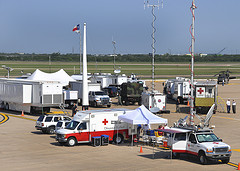
Historic weather conditions are resulting in astronomical costs to taxpayers. Public officials try hard to plan, predict and handle disasters efficiently, but that’s an impossible task. No disaster is the same, there are no patterns and when one occurs, people need immediate relief.
There’s reason to wonder if government can ever be equipped to ensure continuity and safety during weather such as the country has experienced in recent years. Snowstorms, hurricanes and droughts have created almost insurmountable problems and the burden for efficient and adequate emergency management has fallen squarely on the backs of public officials who never have adequate resources.
According to the Bureau of Labor Statistics, emergency management specialists employed by government earn about $52,000 a year. That’s the average salary, and it is not commensurate with the critical nature of the job. The responsibilities of emergency managers include “coordination of disaster responses, crisis management, disaster preparedness, emergency planning, technological contingency plans and process development for hostage situations.” That’s not all…but. here’s the point – their responsibilities are huge, as well as critical in nature, and they either perform well or the entire country suffers. Some can manage to succeed, but not all.
Not only must emergency managers provide for the safety and welfare of citizens, oversee critical infrastructure operations and crisis communication with citizens and the media, but they are also responsible for trash pickup and shelter for citizens with no place to go. The responsibilities are daunting.
No public budget adequately allocates funding for emergencies. The Federal Emergency Management Agency (FEMA) spent nearly $15 billion on recovery for Hurricane Sandy, and $19.6 billion on Hurricane Katrina in Louisiana alone. Cities and counties spent billions more. None of the final totals fell within what had been set aside in budget planning for disasters.
And, while hurricanes, earthquakes and mudslides generally warrant federal recovery funds, many other weather occurrences result in serious havoc, but local officials know there will be no federal funding assistance. This year alone, winter storms caused a negative economic impact of $15 billion. Those costs will be felt acutely in the South because those areas are simply not well-equipped to deal with freezing weather.
Weather affects everything – families, property, food, retail, schools, insurance, transportation, hospitals and public safety. Weather also impacts the most basic tenets of economic prosperity for any community. Hats off to emergency teams throughout the country who have provided valiant service. Taxpayers appreciate your efforts and your commitment to public service.
For updates on the latest government trends, follow our SPI Insights.

